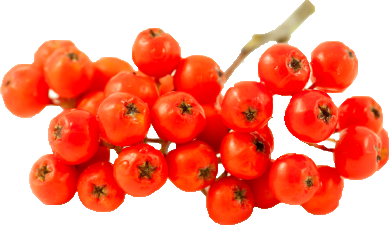|
Many people think that Rowan berries are poisonous but that
simply isn’t the case, they just have to be cooked. When they are, they turn
into a delicious and bitter jelly or marmalade.
Some of the health benefits of rowan berries include its
ability to boost the immune system, strengthen the respiratory system, improve
digestion, prevent certain cancers, and reduce bacterial infections.
Rowan berries, sometimes called “rowanberries” are small,
acidic fruits that grow on rowan or mountain ash shrubs or trees. The most
widely consumed species has the scientific name Sorbus aucuparia, but there are
dozens of different cultivars and species. Rowan berries are actually “pomes”
as berries are a single fruit. These shrubs and trees are quite rare in parts
of the world, and are practically extinct in England, where they used to figure
widely in folklore and mythology. They have also spread to parts of North
America and have also been in Scandinavia and Newfoundland for hundreds, if not
thousands of years. They tend to grow in cold climates and are found in
Northern Europe, high in the Balkans, and in Northern Asia, as well.
The entire shrub/tree is useful, including the bark, leaves,
and fruit. The fruit, depending on the cultivar, can actually be toxic in some
cases, but most of that toxicity fades if heated or frozen for extended periods
of time. Commonly, the berries are used in alcoholic beverages or liqueurs, but
can also be used as a bitter side flavouring of certain game dishes. They are
also commonly pressed into jams and jellies. As the astringent taste fades with
freezing, they are also commonly used as “superfoods”, due to the recently
discovered organic compound content of this rare berry.
|
|
This tiny berry packs quite a nutritious punch, and includes
high levels of vitamin C, sorbic acid, and dietary fibre, but they are mostly
praised for their unique antioxidant composition. Rowan berries contain
anthocyanins, tannins, polyphenol compounds, and flavones, including various
types of quercetin and rutin.
Cancer
Prevention:
The high levels of antioxidants found in rowan berries make
it a very powerful superfood against various chronic diseases, including
cancer. Quercetin varieties and sorbic acid both act as antioxidants, preventing
the harmful effects of free radicals throughout the body. Free radicals are the
dangerous by-products of cellular metabolism that can cause healthy cells to
mutate into cancerous cells, or simply perish. Therefore, eating rowan berries
can significantly boost your antioxidant levels, which means preventing
cancerous growths, reducing the chances of premature aging, improving the
health of your skin, increasing cell regeneration and healing rates, and
boosting eye health, including reducing the chances of macular degeneration.
Immune
System Boost:
Although rowan berries aren’t packed with a variety of
vitamins, they are found to have high levels of vitamin C. Ascorbic acid is a
very important element in human health, as it can stimulate the production of
white blood cells and act as an antioxidant as well. Furthermore, vitamin C is
essential for a number of bodily processes, including the creation of collagen,
which strengthens muscle tissue and helps to build/repair blood vessels.
Antibacterial
Activity:
Sorbic acid has been directly linked to reducing the effects
of microbial and bacterial agents on the skin and in the body. Therefore, in
cosmetic use, rowan berry extracts are occasionally used, but as a food source,
it can function as an antibacterial and antimicrobial booster.
Digestive
Health:
Fibre, which is found in moderate amounts in rowan berries,
helps to facilitate digestion and reduce constipation by bulking up stool and
optimizing your gastrointestinal system. Furthermore, the organic compounds in
rowan berries are thought to directly improve any symptoms of diarrhoea,
although the exact mechanism of this is still unclear.
Respiratory
System:
In traditional
medicine, rowan berry juice was used to reduce inflammation of the respiratory tract,
improve sore throats, and relieve asthma and congestion. Some of this may be
due to the antioxidant compounds that also act as anti-inflammatory agents,
while vitamin C is known to soothe the symptoms of asthma. Whatever the direct
links are, rowan berries have been trusted for generations as a home remedy for
respiratory ailments.
A Final Word
of Caution:
When rowan berries are picked in the wild, they contain high
levels of parasorbic acid, which can actually cause kidney damage, indigestion,
and a range of other illnesses. However, once frozen or heated, this acid
changes to the beneficial sorbic acid, which our body finds very useful.
Therefore, don’t go out picking wild rowan berries, make sure you properly
prepare them first to get the most benefits!
|

